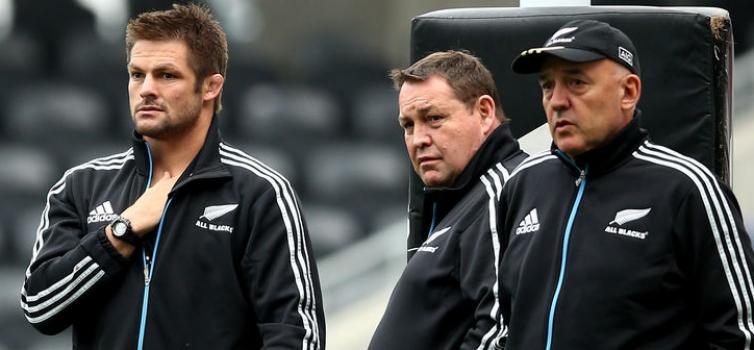How to think like an All Black: no 'dickheads' allowed
Articles / /

Richie McCaw, Steve Hansen and Gilbert Enoka
Written by Simon Austin — April 28, 2017
NEW ZEALAND mental skills coach Gilbert Enoka has given an insight into how to think like an All Black.
Enoka has worked with the All Blacks for 16 years and 204 Tests, during which time they have won back-to-back World Cups.
He introduced a ’no dickheads’ policy, which is policed by the players themselves - and can even mean the head coach being pulled up.
Enoka described dickheads as “people putting themselves ahead of the team, people who think they’re entitled to things or expect the rules to be different for them, people operating deceitfully in the dark, or being unnecessarily loud about their work."
He added: “The management might not spot these counterproductive behaviours. The players and leaders themselves should call others out for their inflated egos.
“Our coach Steve Hansen, a brilliant man, once came into a team meeting a few minutes late. As he walked in, one of the senior players stood up and said, 'Coach, you can’t be late. Not again, please.' So it’s actually the team monitoring this behaviour.
“A dickhead makes everything about them. Often teams put up with it because a player has so much talent. We look for early warning signs and wean the big egos out pretty quickly. Our motto is, if you can’t change the people, change the people.”
The underpinning reason for this is Enoka’s belief that you can’t “be a positive person on the field and a prick off it”. He was also fundamental in introducing the Kapa o Pango haka in 2005, which was designed to make the Maori ritual seem relevant again. Enoka says culture is crucial to any team.
“You can have all the strategies in the world, but in the end, what will enable you to overachieve – or underachieve – is your culture,” he told Adidas's Gameplan A.
“We nourish the All Blacks culture every day by drawing from our rich Maori heritage. In our cornerstone philosophies, the team towers above the individual. You will never succeed on your own, but you will be successful as an individual if the team functions well.
“As the custodian of the culture, I make sure everyone has a sense of belonging. When you walk to the pitch, you should feel you belong to this place and that it’s fed and nourished by the people. Too many organisations focus on the vision and values when they should feed a sense of belonging instead, especially if you’re working with a myriad of cultures.
“As a team, you can sit down and allow yourself to be vulnerable. It’s a powerful strategy - once I’m prepared to share my vulnerability, and everyone else is too, we create an environment that becomes a culture of acceptance.”
Former All Blacks coach Wayne Smith has said: “It is hard for me to imagine any of the success I have had without Bert there.”
But the path to acceptance for this exceptional coach has not always been a straightforward one. When Smith wrote to the Canterbury Union asking permission for Enoka to travel to a sevens tournament in 1989, he had to pretend his mentor was a masseur, because psychology was regarded as quackery within rugby circles at that time.
The coach himself has a remarkable story which has shaped his philosophy. After his father left and his mother couldn’t cope, Enoka was sent to a children’s home at the age of just 18 months.
“They didn’t have any welfare system in that day," he said, "so they basically swooped us up and put us in a children’s home. A lot of my resolve was probably forged back then.”




-1.png)





